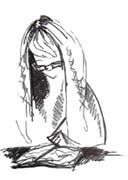 In the beginning of the book, Vanauken assures the reader that there's something in UNDER THE MERCY to offend everybody. Having read UNDER's predecessor, A Severe Mercy, I found this hard to believe, but even with my guard up, Vanauken did manage to offend me, but in the best sort of way. He made me think, very hard, about lots of important things.
In the beginning of the book, Vanauken assures the reader that there's something in UNDER THE MERCY to offend everybody. Having read UNDER's predecessor, A Severe Mercy, I found this hard to believe, but even with my guard up, Vanauken did manage to offend me, but in the best sort of way. He made me think, very hard, about lots of important things.I was definately skeptical of the merit of "A sequel to A Severe Mercy", but Vanauken did well--aside from having plenty of interesting and challenging things to say, he provided a fascinating glimpse of himself post-Mercy, and of the (most wonderful) writing of A Severe Mercy.
A Severe Mercy tells of Vanauken's singular marriage--UNDER THE MERCY tells of the thirty or so years following his wife's death, years that are touched on, however briefly, toward the end of A Severe Mercy, but which are fleshed out here as Vanauken ruminates on his involvement in the Civil Rights, Antiwar and Women's Lib Movements, his departure and return to the faith, and his conversion to Catholicism. He includes several essays and poems and articles written at different periods throughout his life, and is fond of quoting himself (sometimes to the extent of striking me as a bit pompous), but he provides a rather unique perspective, given his experiences, on the state of the Church and Christianity. Some of his writings on feminisim and the Spirit of the Age were particularly good (and offensive), and gave me plenty to ponder.
Despite my skepticism, I was impressed, and while I enjoyed the extra little glimpses he offered of himself and of Davy, after another ten years of reflection (from writing A Severe Mercy), I also found myself enjoying his theological articles much more than I'd anticipated. I somehow didn't pick up on how fiercely opinionated Vanauken is, while reading A Severe Mercy, but perhaps the subject in that book didn't allow for quite so much of his stubbornness to show through. All in all, it was a wonderful follow-up, and I'll be reading it again--probably on alternate years with A Severe Mercy.
RATING: 5

 Could it be true? A John Irving novel that actually didn't make me cry like a little baby? I guess it is: I made my way through all 820 pages without shedding a single tear, and I'm not sure I could be more surprised. Normally, his novels come with at least one scene that just gets me--he sets it up from page 1, and I see it coming, approaching steadily, growing larger and larger on the horizon, until suddenly it's upon me and I cannot fend it off. Emotionally, John Irving's books tend to just wipe me out.
Could it be true? A John Irving novel that actually didn't make me cry like a little baby? I guess it is: I made my way through all 820 pages without shedding a single tear, and I'm not sure I could be more surprised. Normally, his novels come with at least one scene that just gets me--he sets it up from page 1, and I see it coming, approaching steadily, growing larger and larger on the horizon, until suddenly it's upon me and I cannot fend it off. Emotionally, John Irving's books tend to just wipe me out. A SEVERE MERCY is the sort of book that tends to be given as a gift. Example: one of Mitch's best friends gave him a copy less than a month before Mitch and I "met", feel in love, etc. We read the book aloud together during our engagement, and the influence Van and Davy's Shining Barrier has had in our relationship is incalculable--I recently reread A SEVERE MERCY and was struck anew by how many aspects of our marriage have been influenced by Vanauken's book. I was also quite grateful that A SEVERE MERCY found us when it did.
A SEVERE MERCY is the sort of book that tends to be given as a gift. Example: one of Mitch's best friends gave him a copy less than a month before Mitch and I "met", feel in love, etc. We read the book aloud together during our engagement, and the influence Van and Davy's Shining Barrier has had in our relationship is incalculable--I recently reread A SEVERE MERCY and was struck anew by how many aspects of our marriage have been influenced by Vanauken's book. I was also quite grateful that A SEVERE MERCY found us when it did. Like Fight Club or The Stepford Wives, THE BEACH is yet another book that has been eclipsed by the movie it inspired--the sort of book that, when you tell people what you're reading, tends to elicit the response, "You mean, like the movie?" Yes, this is THE BEACH, like the movie, but judging from the trailer alone, I'd be willing to say "like the movie, but better" (I can already tell what facets of the plot they blasphemously altered).
Like Fight Club or The Stepford Wives, THE BEACH is yet another book that has been eclipsed by the movie it inspired--the sort of book that, when you tell people what you're reading, tends to elicit the response, "You mean, like the movie?" Yes, this is THE BEACH, like the movie, but judging from the trailer alone, I'd be willing to say "like the movie, but better" (I can already tell what facets of the plot they blasphemously altered). In short, THE SILMARILLION is the Bible of Middle-Earth. Epic battles, the struggles of certain chosen individuals, the creation of the world and more, all told in a beautiful "and so it was" sort of tone. True to form, even the names are difficult to remember (thank goodness for the "Index of Names": I read almost half the book before I discovered this handy tool tucked away in the back of the book)--think Finwe, Fingon, Finrod, Fingolfin, Finduilin and, my personal favorite, Finarfin.
In short, THE SILMARILLION is the Bible of Middle-Earth. Epic battles, the struggles of certain chosen individuals, the creation of the world and more, all told in a beautiful "and so it was" sort of tone. True to form, even the names are difficult to remember (thank goodness for the "Index of Names": I read almost half the book before I discovered this handy tool tucked away in the back of the book)--think Finwe, Fingon, Finrod, Fingolfin, Finduilin and, my personal favorite, Finarfin. OTHER VOICES, OTHER ROOMS is Capote's first novel. He wrote it when he was something like 21, which is very impressive. Set in spooky rural Kansas (right?), the novel follows Joel Knox as he sets off, after the death of his mother, to live with the father he's never met. Full of ominous, inconclusive scenes and characters that made me vaguely uneasy OTHER VOICES, OTHER ROOMS is told in the gorgeous sort of prose that is meant to be read aloud.
OTHER VOICES, OTHER ROOMS is Capote's first novel. He wrote it when he was something like 21, which is very impressive. Set in spooky rural Kansas (right?), the novel follows Joel Knox as he sets off, after the death of his mother, to live with the father he's never met. Full of ominous, inconclusive scenes and characters that made me vaguely uneasy OTHER VOICES, OTHER ROOMS is told in the gorgeous sort of prose that is meant to be read aloud.